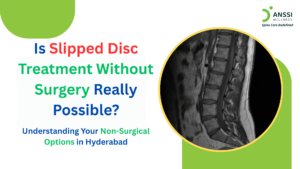Back pain is one of the most common health complaints across the world, affecting people of all ages and professions. From long working hours at desks to heavy lifting, poor posture, or age-related degeneration, the causes are many.
Often, patients with severe or chronic back pain are advised to consider surgery. However, surgery is not always the safest or most effective solution. In many cases, non-surgical alternatives can deliver better long-term results without the risks or lengthy recovery associated with invasive procedures.
Let’s explore the risks of back surgery and highlight effective non-surgical treatments such as spinal decompression, physiotherapy, and lifestyle modifications that can help you live pain-free.
The Risks and Limitations of Back Surgery
Surgery is often seen as a “quick fix” for chronic back pain, but the reality can be very different. Back surgery carries several risks, including infections, blood clots, nerve damage, or Failed Back Surgery Syndrome (FBSS), where the pain persists or worsens even after the procedure.
Recovery from surgery can also take weeks or months, requiring patients to restrict activity and depend on pain medication. Worse, studies show that pain recurrence is common, especially for conditions like herniated discs or spinal stenosis.
Considering these limitations, it’s worth exploring safer and non-invasive alternatives that target the root cause of back pain.
Non-Surgical Spinal Decompression Treatment
One of the most effective non-surgical treatments available today for chronic back pain is non-surgical spinal decompression treatment. This advanced technique uses a specialised decompression table to gently stretch the spine, creating negative pressure within the discs. This negative pressure helps pull herniated or bulging disc material back into place, reducing pressure on spinal nerves.
The treatment also promotes nutrient-rich fluid and oxygen flow into the discs, encouraging natural healing. Patients suffering from slipped discs, sciatica, degenerative disc disease, and spinal stenosis often find significant relief after a few sessions.
Unlike surgery, spinal decompression is non-invasive, painless, and requires no downtime. It directly addresses the underlying issue, rather than just masking the symptoms.
Physiotherapy and Rehabilitation
Another highly effective alternative is physiotherapy. Guided exercises and stretches help strengthen the muscles that support the spine, improving flexibility and stability. A physiotherapist also teaches posture correction techniques that prevent undue strain on the back.
Physiotherapy may include manual therapy, soft tissue mobilisation, and targeted strengthening routines. For patients recovering from injuries or struggling with chronic pain, it improves range of motion, reduces stiffness, and enhances overall spinal health.
Unlike surgery, which often requires months of rehabilitation afterward, physiotherapy is both a treatment and a prevention method. It equips patients with the tools they need to actively manage and prevent future back problems.
Lifestyle Changes for Long-Term Relief
Lasting relief from back pain isn’t just about treatments; it also requires consistent lifestyle changes. Simple adjustments in daily life can have a profound effect on spinal health.
- Posture correction: Maintaining the right posture while sitting, standing, and working reduces unnecessary stress on the spine. Ergonomic chairs, lumbar support cushions, and proper desk setups are valuable investments.
- Regular exercise: Low-impact activities like walking, swimming, and yoga keep the spine flexible and strengthen core muscles that support the back.
- Weight management: Excess weight increases spinal stress, particularly on the lower back. A balanced diet and active lifestyle play a crucial role in reducing this burden.
- Stress management: Mental stress often translates into physical tension in the neck and back muscles. Practising mindfulness, deep breathing, and relaxation techniques can ease this strain.
These changes, when combined with treatments like spinal decompression and physiotherapy, create a holistic, long-term approach to back pain relief.
About ANSSI:
ANSSI Wellness focuses on improving the quality of life for patients suffering from spinal issues, aiming to provide relief where other conventional treatments have failed. Through advanced Non-Surgical Spinal Decompression Treatment, ANSSI is committed to helping patients avoid surgery and recover in a safe, effective, and compassionate environment.
Connect with ANSSI Wellness on LinkedIn, Instagram, and Facebook for expert guidance.




